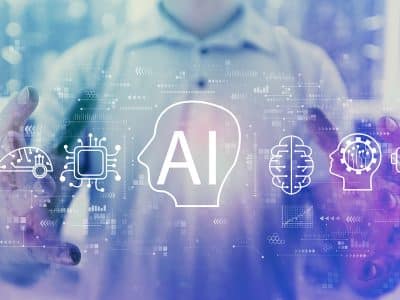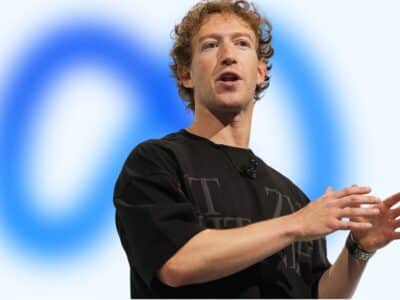Generative AI has created a major intellectual property problem, tech and legal experts told Arabian Business, as the technology begins to generate creative output like images, artwork and music, with a simple prompt.
It can now create artwork in the style of a specific artist – dead or alive – and music in the voice or style of a specific singer or artist. It can also write songs, entire books, podcast episodes and scripts for speeches and so much more, in the style of a specific writer, singer, or even news website.
This, combined with the fact that it trained on enormous datasets without the consent of the creatives that it can now mimic, have given rise to a grey and ambiguous legal area. Experts across the globe are scrambling to understand how this will change the legal landscape of intellectual property rights as the technology continues to gain ground and become more advanced and accessible.
“AI has certainly given rise to legal grey areas across the world,” Hannah McCarthy, Intellectual Property Counsel at Endava, told Arabian Business.
“Lawmakers will need to introduce new clauses or enact a new law to cope with many new issues such as establishing or revising existing creativity criteria, originality, assessing the level of creativity involved in AI-generated contents when compared to pre-existing contents, and define plagiarism in AI content, etc,” said Munir Suboh, Partner and Head of Intellectual Property at Dubai-based law firm BSA Legal.
As of yet, there is no agreed interpretation of how intellectual property rights should be assigned to AI-generated content, meaning that such cases will likely be handled in the traditional way to assign such rights, Suboh added.
Regulating this area or setting up a framework is very tricky because it poses some ethical considerations, such as who would be held accountable if such content actually does violate copyright and intellectual property laws. For instance, arguments could be made that the person who wrote the prompt, or the founder of the generative AI platform could have copyright, or perhaps even the artists whose work was used to train the AI.
“To date, there is no universally established guidelines on how to treat AI-generated content. In the past, any tools of the creator were treated merely as tools and the reasoning behind this is that the creator was still responsible for the creative input associated with a work,” Suboh explained.
“Most recently however, we saw legislations in the EU and proposed draft of [Intellectual Property] law in some countries, such as KSA, to deal with the copyrights resulting from AI. The proposition [was] to make the products in public domain if there is no clear link to preowned machine or an entity that controls/owns such machines.”

But according to McCarthy, one of the key concerns around intellectual property protection with regards to AI “relates to the materials used to train these systems.”
“Systems such as DALL-E and ChatGPT have been trained on vast repositories of example materials – ranging from artworks, photographs, books, code and more – in order to train and develop their algorithms,” she added.
Lack of transparency about the content incorporated in AI training materials undermines user confidence in whether AI developers had the right to legally use them for training purposes or not.
“If an AI output replicated a substantial part of one of the works in the original training set, the owner of that original work could assert a copyright infringement claim if the AI output is used,” she added.
Legal cases are already beginning to emerge around this topic. In January last year, Getty Images sued Stability AI in the UK. Getty alleges that Stability AI, an entity under AI company Stable Diffusion, processed its images in training the system which infringed Getty’s copyright. McCarthy suggests that the outcome of this lawsuit could perhaps provide some valuable insight into how judicial systems will rule on such issues moving forward.

Samir Safar-Aly, Financial Regulatory, Compliance & Investigations Counsel at law firm Baker McKenzie in the UAE, shared the same concerns.
Safar-Aly, who is also the law firm’s fintech and AI lead for the Middle East, told Arabian Business that controversies around generative AI are beginning to erupt in all areas of intellectual property law, ranging from copyright and patents to trademarks and publicity rights. Music companies like Universal Music Group have reportedly requested major streaming services to block AI companies from “scraping” the music they host to create imitations, he said.
“There are a number of IP-related issues relevant to AI… However, it is copyright law that is getting the most attention in legal disputes – where there are two key issues: whether AI-created works are copyrightable under relevant copyright law, and whether the output of AI-created works infringes on existing copyright materials – which are issues that are often not known to AI users,” Safar-Aly explained.
“Whilst the EU’s efforts to put together an AI Act has been mainly focused on consumer protection as opposed to IP issues, it is worth noting that an initial iteration of that draft law did consider having AI, an artificial persona, have the ability to own IP. Those draft provisions were scraped.”

Dead artists
Art industry experts recently expressed conflicting opinions to Arabian Business regarding the future implications of generative AI in art creation. While some anticipate a complete transformation of the industry, influencing art pricing and even creating an entirely new market segment, others maintain that such content lacks the essential human touch that defines art, suggesting minimal impact on the industry.
“Since IP was created to protect human creativity, innovation and advancement of science and work of arts’ originality, the absence of direct human intervention for the creation of a work has not been explicitly anticipated in the existing legal frameworks and to date,” added Suboh.
“In terms of liability, the laws made a link between the outputs and implications of using machines and liability under tort theory, however, the ownership of rights remains an issue to determine and still to be addressed in the laws.”
Mimicking the style of deceased artists should be assessed based on whether such artworks are still protected or not, he said. But the main challenge associated with generative AI is determining who owns the produced intellectual property from such capabilities.
“Due to the ‘deep learning’ involved in generative AI and different directions in compiling data and outcomes, there is not a direct human intervention or link to existing data, information or rights created by third parties, especially where the content is produced as a result of the systems own deep learning.”
Who’s to blame for an IP violation?
But this blurs the lines as to who actually owns the intellectual property and who would be liable. Would it be the one who input the prompt into the generative AI tool or the founder of the tool itself?
“There’s also a question of IP ownership,” said McCarthy.
To be protected under copyright legislation in the UAE and several other countries, an eligible work must be original or creative in the literary, artistic, or scientific domains, McCarthy explained.
“There are various interpretations of what originality or creativity mean in this context and it is not clear how it applies to an AI system in practice and whether a machine could be creative or original,” said McCarthy.
“If we cannot be certain whether this test can has been met and copyright has arisen, we cannot be certain as to whether an infringement has occurred when the work has been reproduced.”
The US Copyright Office, for instance, states that only works created by human beings are protected, not an AI model.
“Interestingly, while AI raises questions and concerns around copyright and intellectual property, AI systems may soon have a role to play in the enforcement of these protections. As far back as 2019, the UAE’s Ministry of Economy made moves expressing its intent to leverage AI to help enforce intellectual property issues.
“With traditional methods, the ability to search for instances of copyright or IP infringement has been limited, but with its vast computing capabilities, AI can greatly streamline the process,” McCarthy said.
But according to Safar-Aly, there may be a way to identify who the blame would fall on should an intellectual property concern arise.
“The whole issue of derivative works does have a fine line,” he said.
“For example, asking generative AI to create an output ‘in the style of’ a copyrightable content, like a particular favourite show or movie, if specific copyrighted characters are used, this could create legal issues. But if the “style” is loosely used, there are certain exemptions under the law to consider.”
He referred to the parody exception or what is referred to in Europe as the “pastiche” exception which is often used to legitimise common cultural and communication practices.
“The level of human input within the context of generative AI output is clearly the main issue that AI is having to, and will have to, grapple with when it comes to whether generated content is copyrightable in the first place.”
But he suggested that tracing the design process of the work in question to understand how it was designed, potentially through the use of “AI explainable protocols” that provide detailed explanations such as LIME (Local Interpretable Model-Agnostic Explanations) or SHAP (Shapely Additive Explanations), will make it easier to find its “unintended role” in intellectual property evaluation.








